Nowadays, e-learning has become an integral part of education and professional development. Learning Management Systems (LMS) are crucial in managing online educational content. However, many organizations need extra functionalities and integrations to enhance their LMS platforms. This is where LMS API comes into play. This article will explore the top 10 APIs for Learning Management Systems available. Moreover, it will compare their features and functionalities to help you make an informed decision.
6 Emerging Trends of Online Education
The online learning industry is evolving rapidly, making it increasingly challenging to stay abreast of the latest trends. Here, we highlight some of these key developments:
- Personalized Learning Paths: Future online learning platforms will increasingly use AI and data analytics to tailor educational content and teaching styles to individual learner preferences and needs, enhancing engagement and effectiveness.
- Integration of AR and VR: Augmented Reality (AR) and Virtual Reality (VR) technologies will become more prevalent, offering immersive and interactive learning experiences that make complex subjects more accessible and engaging.
- Mobile Learning: As mobile device usage continues to rise, online learning will adapt by offering more mobile-friendly courses and resources, allowing students to learn anytime, anywhere.
- Microlearning: This trend involves breaking down learning material into small, manageable chunks, catering to shorter attention spans, and fitting learning into busy schedules.
- Collaborative Online Environments: Future online learning will emphasize community and collaboration, with platforms facilitating more interactive group work, discussions, and peer-to-peer learning opportunities.
- Lifelong Learning: There will be a growing focus on continuous education, with courses and programs designed not just for traditional students but for learners of all ages, emphasizing skill development and personal growth.
What are API Integrations for LMS?
API integrations for Learning Management Systems (LMS) allow the LMS to communicate and interact with other systems, applications, or services. Moreover, these APIs for LMS integrations enhance the functionality and flexibility of the LMS by enabling seamless data exchange and automated workflows. Here are some common API integrations for LMS:
1. User Management Integration
Integrating the LMS with user management systems like HRIS (Human Resource Information System) or CRM (Customer Relationship Management). Furthermore, it enables automatic user provisioning, synchronization of user data, and centralized user management.
2. Content Integration
APIs can be used to integrate the LMS with content repositories, such as document management systems or cloud storage platforms. Along with that, it allows seamless access to course materials, multimedia content, and other learning resources.
3. Assessment and Grading Integration
Integration with assessment or testing platforms enables the LMS to import assessments, quizzes, and exams. Moreover, it also exports grades and performance data back to the LMS for tracking and reporting.
4. Messaging and Communication Integration
Above all, you can integrate with communication tools like email, instant messaging, or notification services. Moreover, it will allow the LMS to send automated notifications, reminders, and announcements or facilitate communication between instructors and learners.
5. Analytics Integration
It is also possible to integrate the LMS with analytics or reporting systems. Moreover, this provides access to detailed data and insights about learner engagement, performance, and course effectiveness. Additionally, it helps administrators and instructors make data-driven decisions.
6. Video Conferencing Integration
Above all, the integration of the LMS with video conferencing platforms allows instructors to schedule and conduct live virtual classes, webinars, or online meetings. Moreover, it enables them to do it directly from the LMS interface.
7. CRM Integration
When you integrate the LMS with a CRM system, it enables capturing and tracking learner data, course enrollments, and interactions to improve personalized learner experiences. Furthermore, it enables marketing campaigns and customer relationship management.
Important Features of LMS API
Regarding Learning Management System (LMS) APIs, understanding the important features is crucial. It is essential for developers and organizations seeking to enhance their e-learning platforms. Moreover, these APIs serve as the backbone of an LMS, empowering seamless integration, data exchange, and automation. Explained below are the vital features that make an LMS API a powerful tool for creating a dynamic and efficient learning environment:
- Course Management: The LMS API should provide methods to create, retrieve, update, and delete courses within the LMS. Subsequently, this includes course creation, enrollment, syllabus management, and course organization.
- User Management: It should offer functionality to manage users within the LMS. Moreover, this includes features like user authentication, registration, enrollment, user profile management, and role-based access control.
- Content Management: Your chosen API should allow for the management and delivery of course content. Besides, it should include features like uploading and organizing course materials, multimedia content, documents, and assessments.
- Enrollment and Progress Tracking: The API should provide methods to enroll users in courses, track their progress, and record completion data. Furthermore, it includes features like tracking course completion, generating progress reports, and managing prerequisites and assessments.
- Grading and Assessment: The API for LMS should support grading and assessment features, allowing instructors to create and grade assignments, quizzes, exams, and other assessments. Secondly, it should provide methods to submit grades and retrieve assessment results.
- Communication and Collaboration: The API should support communication and collaboration features within the LMS. Moreover, this includes features like messaging, discussion forums, announcements, notifications, and email integration.
- Security and Authentication: There should be no compromise on data security. After all, the API should include security measures like authentication, authorization, and encryption. As a matter of fact, it will ensure the privacy and integrity of data exchanged between the LMS and external applications.
- Documentation and Developer Support: The API should be well-documented, providing clear instructions, code examples, and reference materials for developers. Along with that, it should also offer developer support channels, such as forums or dedicated support teams, to assist with integration and troubleshooting.
10 Best Learning Management Systems (LMS) APIs
Learning Management Systems (LMS) play a pivotal role in delivering effective online education and training. To sum up, integrating an LMS with powerful APIs is essential to unlock its full potential. Below are the top 10 LMS APIs that provide various features to elevate your learning experience:
1. ZEGOCLOUD
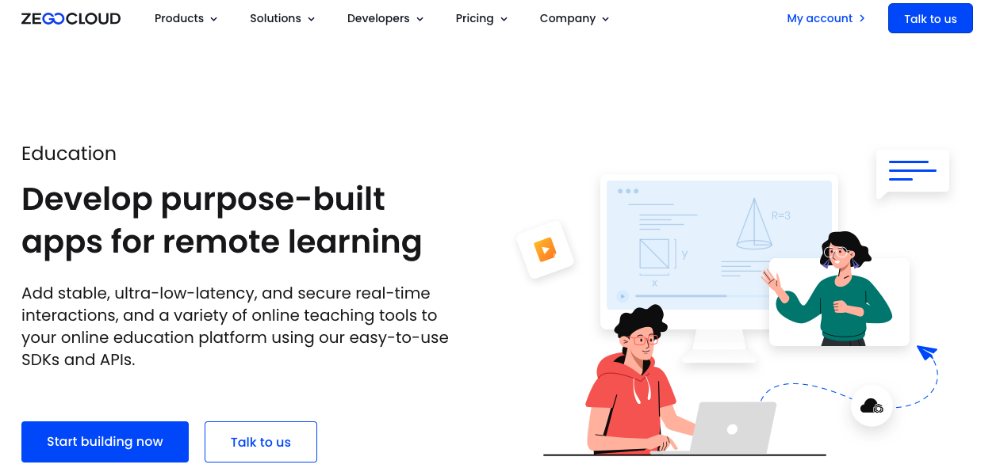
When it comes to finding the best LMS API, ZEGOCLOUD takes the crown. After all, it offers a complete and comprehensive solution for e-learning. With ZEGOCLOUD, you can build and customize the LMS according to your needs. Moreover, if you want to build one-on-one learning apps where teachers can focus on students individually, it is possible with ZEGOCLOUD.
The same is true if you want to go big and create an e-learning solution for the masses. Furthermore, ZEGOCLOUD supports classes with tens of thousands of students. In such classes, students can raise their hands to ask questions and can hold voice and video discussions with their instructors.
ZEGOCLOUD streamlines app development with integrated UIKits, offering low-code, pre-built kits with ready-to-use UI components. This approach allows developers to quickly build unique features and customize user experiences, significantly reducing development time and accelerating time to market, ideal for educational app developers focused on efficiency and quality.
Features
- Live Streaming Classes: With ZEGOCLOUD, users can live stream their classes on social media platforms like YouTube, Facebook, etc.
- Breakout Rooms: Secondly, this Learning Management System API allows you to divide mass classes into smaller groups for content discussion, online exams, and targeted coaching.
- Hybrid Learning: The APIs provided by ZEGOCLOUD help integrate traditional classrooms with virtual classrooms. Besides, this can take the shape of remote students attending a traditional class or a remote teacher teaching a class.
- Focused Learning: Furthermore, it lets schools create specialized classes with a limited number of students to enhance their education. Furthermore, it includes features such as screen sharing, whiteboard, etc.
Pros
- Real-time video and audio chat with ultra-low latency.
- It supports branded virtual backgrounds during online classes.
Con
- The number of advanced features is lacking compared to specialized LMS.
Price
| Voice Call | Starts from $0.99/1,000 participant minutes |
|---|---|
| Video Call | Starts from $3.99/1,000 participant minutes |
| In-app Chat | $499 for up to 10000 users |
| Live Streaming | Starts from $3.99/1,000 participant minutes |
| Super Board | Starts from $1.99/1,000 participant minutes |
| Cloud Recording | Starts from $2.09/1,000 participant minutes |
2. Moodle
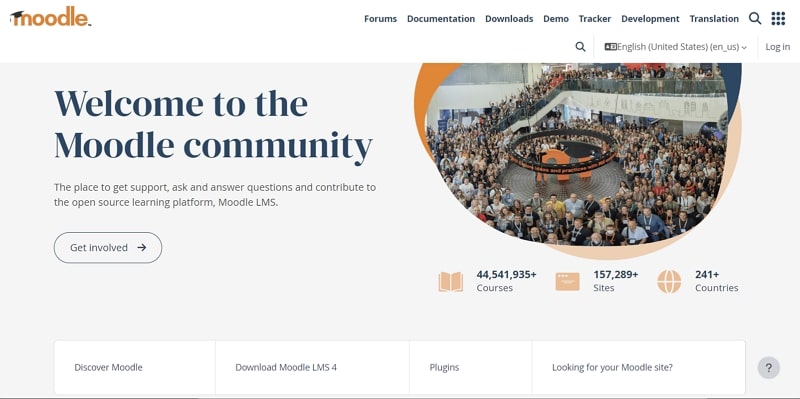
Modular Object-Oriented Dynamic Learning Environment commonly known as Moodle is an open-source learning management system. At its core, Moodle aims to enhance the learning experience. After all, it does that by offering a flexible and interactive online environment for educators and learners. Moreover, it provides a wide range of features and tools that facilitate course creation, content management, collaboration, assessment, and communication.
Features
- Course Management: Moodle allows instructors to create and organize courses, including uploading course materials, setting assignments, and managing grades.
- Communication Tools: All in all, it offers various communication tools such as forums, messaging, and chat, enabling collaboration and interaction among students and teachers.
- Content Creation: Besides, Moodle provides tools for creating and organizing course content, including multimedia elements such as videos, quizzes, and interactive activities.
- Customization: Additionally, this API for LMS allows customization of the platform’s appearance and layout, enabling institutions to create a personalized learning environment.
Pros
- A large and active community of users to help each other.
- Free to use and can be modified according to needs.
Con
- The graphical interface of Moodle is outdated.
Price
- Free
3. Canvas LMS API
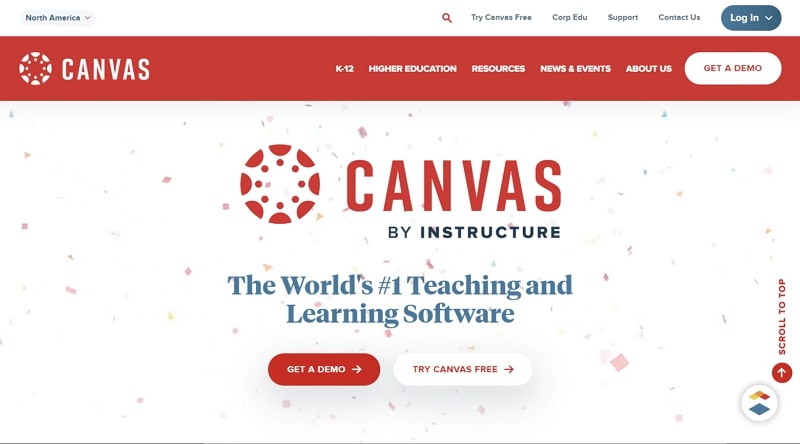
Canvas LMS is a widely adopted platform designed to support online learning and course management for educational institutions. Furthermore, it offers comprehensive tools and features to facilitate teaching, learning, and collaboration in online classroom environments. Additionally, the Canvas LMS API bridges the Canvas platform and external applications, enabling seamless data exchange.
Features
- User Management: After all, you can manage users within Canvas, including creating and enrolling users in courses, updating user information, and retrieving user details.
- Content Management: Notably, this Learning Management System API enables you to upload and manage course content, such as files, discussions, announcements, and modules.
- Grading and Feedback: With this API, you can retrieve and update grades and provide feedback on assignments and quizzes.
- Analytics and Reporting: Moreover, it provides access to various analytics and reporting data, allowing you to track student progress, engagement, and performance.
Pros
- Flexible and extensible interface.
- Automate administrative tasks.
Con
- Users have complained about audio recording not working.
Price
- Contact the Sales Team
4. Schoology
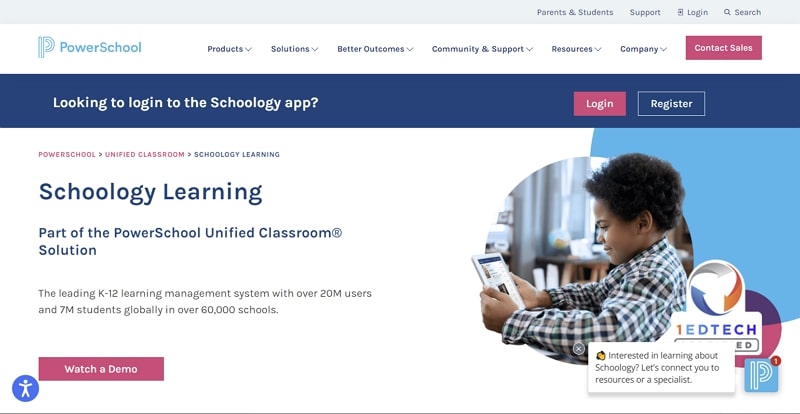
The Schoology Learning Management System (LMS) API is a powerful tool that allows developers to integrate external applications and systems with Schoology. Moreover, it is a popular platform used in education for managing and delivering online courses. After all, the API provides a robust set of features and capabilities. Furthermore, it enables seamless data integration, automation of workflows, and customization of the learning experience.
Features
- Data Integration: Overall, this Learning Management System API allows developers to access and manipulate data within Schoology, including user information, course materials, grades, and assignments.
- File Upload, Links, Embeds, Resources: Above all else, this LMS API allows you to upload files, attach links, and embed resources and attachments.
- Custom Application Development: With the API, developers can create custom applications that interact with Schoology, providing additional functionalities and extending the platform’s capabilities.
- Real-time Data Sync: Along with that, developers can use the API to synchronize data between Schoology and external systems, ensuring that information remains up-to-date across platforms.
Pros
- Enhanced integration and customization.
- Automated workflows and data synchronization.
Con
- Offer limited analytics and can be disorganized at times.
Price
- Contact the Sales Team
5. LearnDash
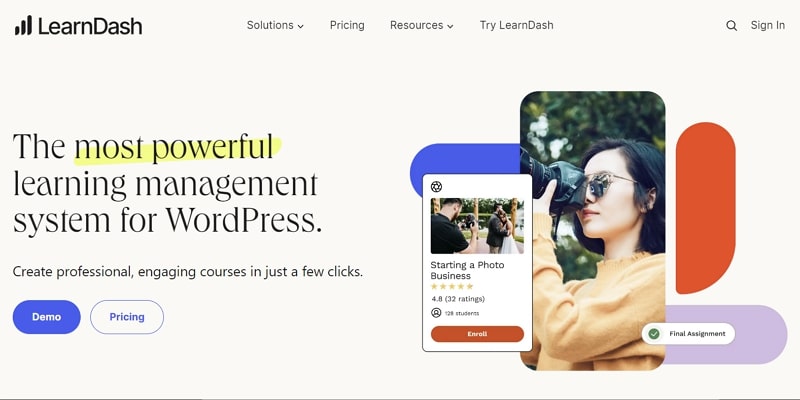
A comprehensive learning management system, LearnDash empowers individuals, educational institutions, and businesses to create and manage online courses easily. Moreover, LearnDash offers a user-friendly interface that simplifies the process of course creation and organization. Secondly, course creators can structure their content by creating lessons, topics, and quizzes, allowing for a seamless progression of learning materials.
Features
- Progress Tracking: With this API, you can access and track learners’ progress, quiz scores, assignments, and completion status.
- Enrollment and Access Control: All things considered, this API for LMS lets you manage course enrollments, including enrolling and unenrolling users in courses and granting or revoking access to specific course content.
- Course Creation: Furthermore, LearnDash provides a user-friendly interface to create and organize online courses. You can create lessons, topics, and quizzes and structure your course content easily.
- Content Drip: Besides this feature allows you to release course content gradually over a specific period. Moreover, you can schedule when lessons or topics become available to learners, giving them a structured learning experience.
Pros
- Flexible course structure.
- Integrates well with WordPress.
Con
- It can be exuberantly expensive.
Price
| LearnDash LMS (1 Site) | $199/year |
|---|---|
| LearnDash Cloud (Starter) | $29/month |
6. Blackboard
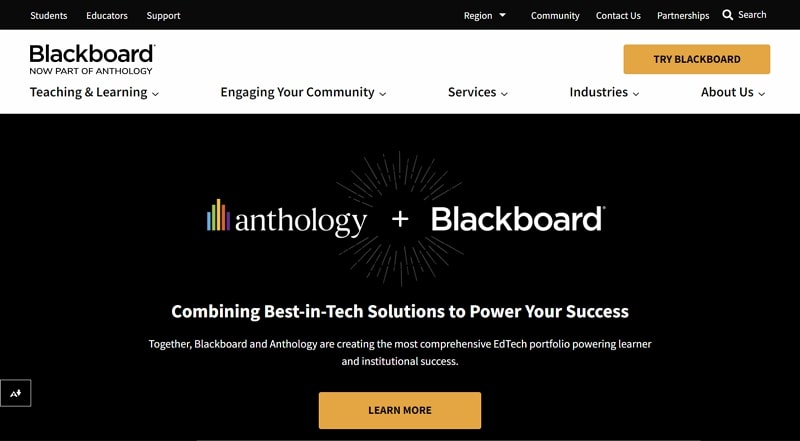
Utilized by educational institutions around the world, Blackboard is a widely recognized learning management system. Furthermore, it serves as a comprehensive platform for delivering online courses and managing educational content. Moreover, it facilitates communication and collaboration among instructors and students. With Blackboard, instructors can efficiently organize and administer their courses. After all, they can create and distribute educational materials and assess student learning through online assessment tools.
Features
- Integration Capabilities: Above all, the Blackboard API enables developers to integrate external applications and systems with Blackboard.
- Gradebook and Feedback: Moreover, it includes a grade book feature where instructors can record and calculate grades.
- Online Assessments: Furthermore, Blackboard enables instructors to create and administer online assessments, including quizzes, tests, and assignments.
- Content Sharing: Secondly, instructors can easily share lecture notes, presentations, videos, and other educational materials with students through Blackboard.
Pros
- Facilitate interaction among the students.
- Provides a centralized platform for instructors.
Con
- It has a complex and sometimes overwhelming user interface.
Price
- Contact the Sales Team
7. Brightspace
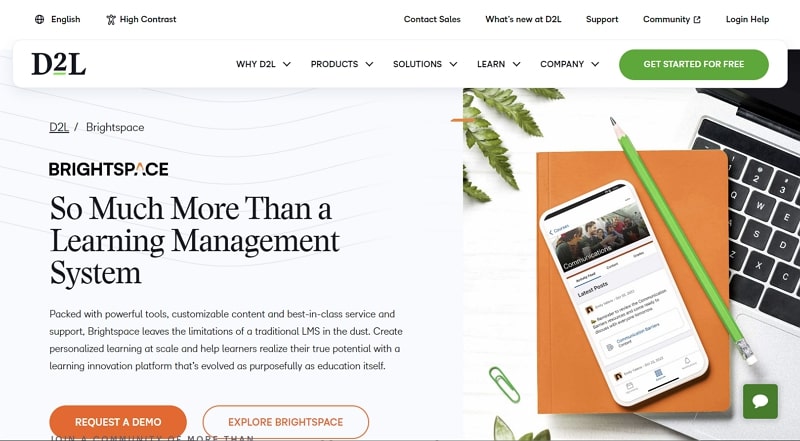
Developed by D2L, Brightspace is a robust learning management system. Moreover, it facilitates online learning, course management, and collaboration in educational institutions and organizations. With its wide range of features and capabilities, Brightspace provides a comprehensive platform for delivering engaging and effective online education. Furthermore, one of the key strengths of Brightspace is its emphasis on communication and collaboration.
Features
- Communication Tools: Overall, this API for LMS offers various communication channels like announcements, messaging, and discussion forums to facilitate interaction between instructors and students.
- Organization and Structure: Besides, it helps you manage all the structure of your organization, such as departments, semesters, enrollments, and the news service.
- Data Integration: The API enables developers to access and retrieve data from the Brightspace LMS, such as user information, course content, grades, and analytics.
- Authentication and Security: After all, this API supports authentication mechanisms to ensure secure access to the Brightspace LMS, protecting sensitive data.
Pros
- Instructors can personalize their courses.
- The platform integrates with various third-party tools.
Con
- Limited customization for students.
Price
- Contact the Sales Team
8. TalentLMS
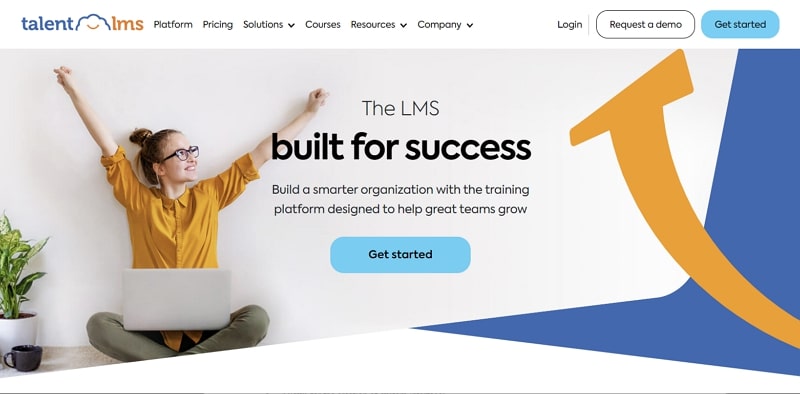
TalentLMS is a cloud-based learning management system (LMS). Moreover, it provides organizations with a robust platform to create, manage, and deliver online training courses. With its intuitive interface and comprehensive features, TalentLMS offers a flexible and scalable solution for businesses, educational institutions, and training providers to streamline learning and development initiatives.
Features
- Gamification: In the meantime, TalentLMS incorporates gamification elements such as badges, points, and leaderboards to increase engagement and motivation among learners.
- Communication and Collaboration: Furthermore, this Learning Management System API provides features for discussion forums, messaging, and real-time chat, enabling learners and instructors to interact and collaborate.
- Reporting and Analytics: After all, developers can use the API to access and extract detailed reports and analytics data from TalentLMS, providing insights into learner progress and course performance.
- Scalability: Besides, TalentLMS can accommodate organizations of different sizes, from small businesses to large enterprises, and can handle a large number of learners and courses.
Pros
- This LMS API is mobile-friendly.
- Allows for the creation of custom interfaces.
Con
- Course setup and course content are lacking in quality.
Price
| Starter | $69/month billed yearly |
|---|---|
| Basic | $149/month billed yearly |
| Plus | $279/month billed yearly |
| Premium | $459/month billed yearly |
9. Litmos
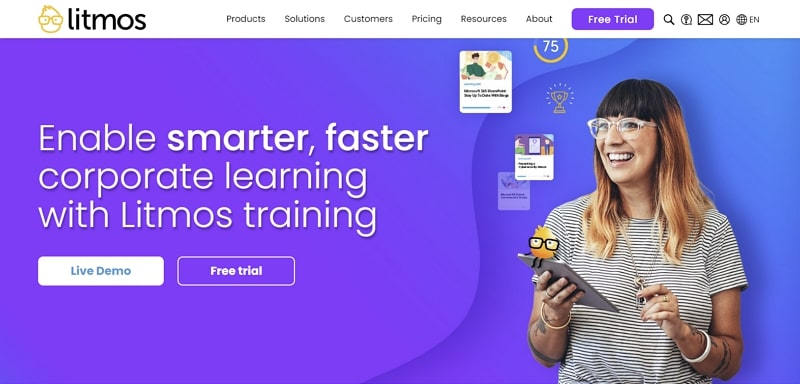
Considered to be one of the most user-friendly learning management systems, Litmos simplifies online education and training. Moreover, it provides organizations and educators with a powerful platform to create, deliver, and manage e-learning courses efficiently. With its extensive range of features and intuitive interface, Litmos empowers businesses, educational institutions, and training providers to deliver engaging and effective learning experiences to their learners.
Features
- Learning Paths: After all, it enables you to create learning paths or curricula that guide learners through a series of courses and modules in a specific order.
- Mobile-Friendly: Overall, Litmos API is designed to be mobile-responsive, allowing learners to access and complete courses on various devices, including smartphones and tablets.
- Compliance Training: Moreover, this LMS API supports compliance training by providing features like certifications, regulatory tracking, and documentation management.
- Content Creation and Management: Besides, this API allows you to create and manage course content, including uploading files, updating content, and organizing course structures.
Pros
- It supports multiple languages.
- Litmos regularly releases updates and new features.
Con
- The customization options in Litmos are limited compared to other LMS APIs.
Price
- Contact the Sales Team
10. Docebo LMS API
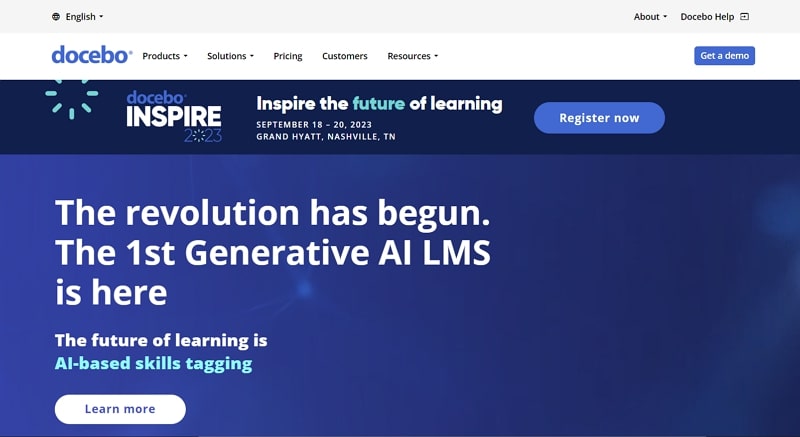
Docebo is a comprehensive learning management system. After all, it empowers organizations to deliver effective training and learning experiences to their employees, partners, and customers. With its robust features, intuitive interface, and flexible customization options, Docebo has gained recognition as a leading solution in the e-learning industry. Furthermore, It provides a centralized platform for creating, managing, and delivering various types of training content.
Features
- Mobile Learning: Notably, Docebo LMS API is mobile-responsive, enabling learners to access training materials on their smartphones or tablets.
- Social Learning Features: Furthermore, it incorporates social learning elements, such as discussion forums, collaboration tools, peer-to-peer learning, etc.
- Advanced Reporting and Analytics: Moreover, this API provides access to granular data, enabling you to generate customized reports and conduct in-depth analyses.
- Automation and Workflow: By leveraging this API, you can automate processes, streamline workflows, and sync data between the LMS and other systems.
Pros
- Allows you to create audience-specific pages.
- Supports over 4,000 integrations to ensure smooth working.
Con
- Users have reported Docebo LMS API to be complex to work with.
Price
- Contact the Sales Team
Choose the Best API for LMS
When choosing the best LMS API, there are several factors to consider. In other words, these include functionality, reliability, ease of integration, support, and cost-effectiveness. Keeping in mind these factors, only one API provider stands out, which is ZEGOCLOUD.
After all, it offers a comprehensive and robust solution for integrating with a Learning Management System (LMS). With feature-rich functionality, reliability, and a developer-friendly approach, ZEGOCLOUD APIs can significantly enhance the capabilities of your LMS.

Read more:
FAQ for APIs for LMS integrations
Q1: Are APIs for LMS integrations secure?
APIs for LMS integrations are designed with security in mind. They typically include authentication and encryption mechanisms to ensure safe data transfer. However, the level of security also depends on the specific API and how it’s implemented, so it’s essential to adhere to best practices in API integration.
Q2: Can APIs for LMS integrations support mobile learning?
APIs can facilitate mobile learning by connecting mobile applications with the LMS. This enables learners to access educational content, participate in courses, and track their progress through mobile devices, offering flexibility and convenience for learning on the go.
Q3: How do APIs for LMS integrations impact the scalability of an LMS?
APIs play a crucial role in the scalability of an LMS. They allow the system to easily integrate with various tools and expand its capabilities as the number of users grows. This means that as educational institutions or businesses expand, the LMS can adapt to increased demands without compromising performance or user experience.
Let’s Build APP Together
Start building with real-time video, voice & chat SDK for apps today!










